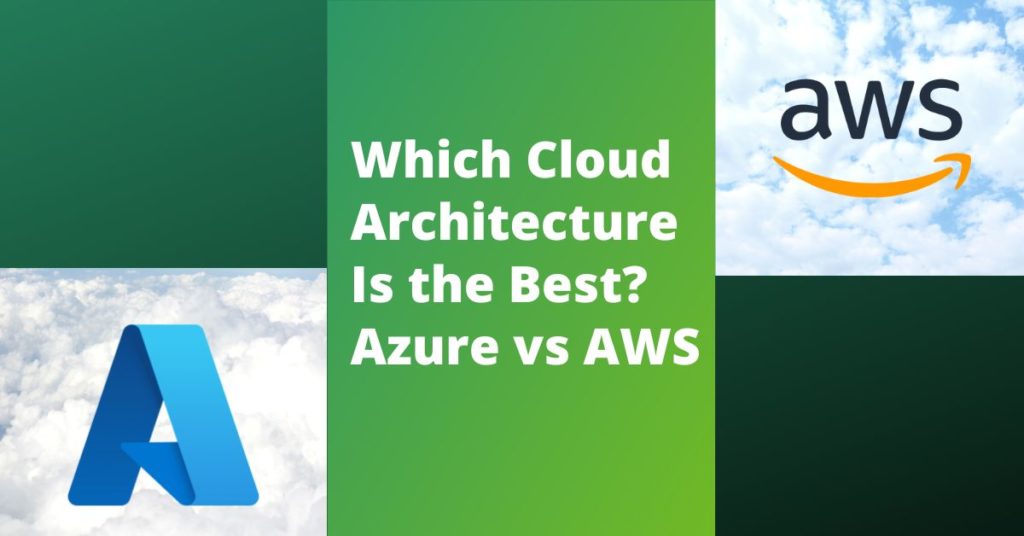
Azure vs AWS. Which one of these cloud architectures are right for your particular business? They’re not new. They’ve been around for a while: Azure since 2010 and AWS since 2006. Azure was developed by Microsoft; AWS by Amazon. This article will describe both pros and cons so you can decide which cloud service is best for your particular company.
What Are Azure and AWS?
These two cloud architecture platforms will build, run and manage applications across multiple clouds with the tools and frameworks your company prefers. Both of them offer more than 200 products.
AWS developed their architecture first and was the only cloud architecture until Microsoft got into the game in 2010. Azure, to be sure, had some difficulties in the first few years, but those difficulties have been resolved. Today it is considered by experts to be superior in many ways.
When looking at the Azure vs AWS platforms question, realize these facts:
- Both use open-source software (OSS) technologies.
- Both offer global coverage.
- Both can use Linux distributions.
- Both support building highly available solutions on Windows or Linux hosts.
Azure and AWS help businesses and governments resolve global IT issues. They are both considered to be flexible, dependable and unshakable as they adapt to the needs of their customers and lend a hand to governments and companies in solving various social and logistical issues. No doubt you’ve heard of Facebook, Uber and Netflix, but you might not know that without AWS or Azure cloud systems, those entities could not exist.
Ask Yourself These Questions for Azure vs AWS:
- How much does each cost?
- What kind of storage service is provided in each?
- Does it support hybrid cloud service?
- What are its networking services?
- What are its database services?
- What are its deployment services?
These are just a few of the factors to consider before choosing one over the other. As you can see, it is not a simple decision. Whether Azure vs AWS is best for your business will depend on your particular needs and situation.
Here’s a quick comparison:
- Both Azure and AWS support hybrid cloud, but Azure supports hybrid cloud better.
- AWS has several pricing models: free tier, per hour, free trial per minute, etc. Azure has a free trial and a per minute model.
- Azure has 140 availability zones. AWS has 61 availability zones.
- Azure offers express routes. AWS offers direct connection.
- Azure provides security by offering permissions on the whole account. AWS security is provided using defined roles with permission control features.
- Azure has a virtual network cloud. AWS has a virtual private cloud.
- Azure machines are grouped into cloud service and respond to the same domain name with various ports. The AWS machine can be accessed separately.
Particulars for Each Aspect of the Clouds
Networking
- AWS uses a private cloud for networking and an API gateway for cross-premises connectivity. For load balancing during networking, they use elastic load.
- Azure uses a VPN gateway for cross-premises connectivity. It manages that with load balancer and application gateway.
Computing
Both use virtual machines for scalability but different approaches and names for their comparable cloud computing and performance services.
- Azure infrastructure management is primarily taken care of behind the scenes by Microsoft. This approach has the advantage of faster processing speeds.
- AWS provides elastic cloud computing (EC2) for infrastructure management across multiple machines, which is more configurable. These sophisticated customizations are typically needed only by big data centers.
Storage
- Azure uses “storage blob,” which lets developers store unstructured data in Microsoft’s cloud platform. It can be accessed from anywhere in the world and can include audio, video and text. Blobs are grouped into “containers” tied to user accounts and are made up of blocks, uploads and large blobs in what is considered a highly efficient manner. It also uses storage cool and storage archive for data.
- AWS uses S3 (simple storage service) to store and protect any amount of data such as data lakes, websites, backups, analytics, etc. It’s considered an industry leader for scalability, data availability, security and performance. It includes documentation and tutorials as well as archive storage by Glacier and IA (infrequent access).
Database
- Azure uses SQL database, MySQL and PostgreSQL for relational databases and Cosmos DB for NoSQL solutions and Redis Cache for that purpose.
- AWS uses a relational database as a service by using RDS. For NoSQL it uses Dynamo DB and for caching it uses Elastic Cache.
Deploying Apps
- Azure has multiple deployment tools such as cloud services, container services, batch, etc. Deployment is done on multiple servers virtually using platform as a service (PaaS) features.
- AWS offers similar solutions with Elastic Beanstalk, Batch, etc. It does not feature an app.
Open Source Developers
- Azure provides the tool for enterprise users that allows them to use the current active directory account to sign into the Azure Cloud platform and runs .NET framework on Windows, Linux and MacOs.
- AWS uses Linux and offers other integrations for different open source applications.
Advantages of AWS
- Simpler licensing method
- Enables you to choose your operating system, programming language and database
- High transfer stability
- Trusted by high-profile customers
- Offers more data centers for availability and low latency
- Allows you to increase or decrease storage according to your needs
- Minimal information is lost during server and storage transfer
- Better DevOps support
Disadvantages of AWS
- The number of choices offered by AWS is confusing to those who do not speak the language or understand the technology
- AWS is a less open private cloud, therefore it is not a popular storage option for sensitive industries such as medical, banking etc.
- Less hybrid-cloud friendly
- AWS lacks customer support, so it is more suitable for a technically savvy group of customers and companies who have their own tech support team
- AWS elastic load balancer is not equipped to handle as many requests as it receives
- Incompatible and weak hybrid strategy
- AWS has so many products, it makes the selection process much harder
Advantages of Azure
- Total support for Microsoft legacy apps
- Fully scalable cloud computing platform offers open access across multiple languages, frameworks and tools
- Offers built-in tools like Azure Stack to help the organization deliver Azure service from data center
- Easy one-click migrations in many cases
- Greater awareness of enterprise needs
- Support for mixed Linux/Windows environments
- Capability for developers and users to create, maintain and deploy applications
- Conversion of on-prem licenses to the cloud
Disadvantages of Azure
- Less flexibility about non-Windows server platforms, when compared to AWS
- Data is hosted globally; customer service is not transparent. If you have data restrictions as to where data must be stored such as in a specific country, you need to verify/specify with Microsoft
- You will be charged extra for paying as you go
Key Difference Between Azure and AWS
| Microsoft Azure | Amazon Web Services (AWS) |
| Virtual network cloud | Virtual private cloud |
| Machines are grouped into cloud service and respond to the same domain name with various ports | Machines can be accessed separately |
| Offers express routes | Offers direct connection |
| Provides security by offering permissions on the whole account | Uses defined roles with permission control feature |
| Better support for hybrid cloud | Supports hybrid cloud |
| Free trial and a per minute model | Several pricing models: free tier, per hour, free trial per minute |
| Limited government cloud offerings | Government cloud options |
| Hybrid cloud (integrates onsite servers with cloud instances) | Limited support for hybrid cloud |
Lastly, your decision to use Azure vs AWS might need to be based on whether or not your business needs a government cloud. Then your choice might need to be AWS as Azure has limited government offerings.
On the other hand, Azure offers hybrid cloud, which can integrate onsite servers with cloud instances. AWS does not have the best hybrid cloud support.
Internos Group can help you understand, make the decision and help with cloud migration if that’s the way you want to go. Contact us or book a meeting to discuss your IT needs. Stay up to date and follow us on Facebook.

